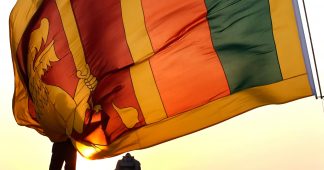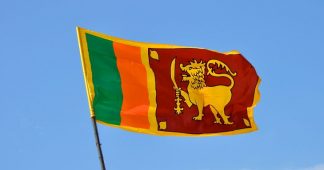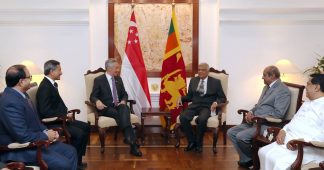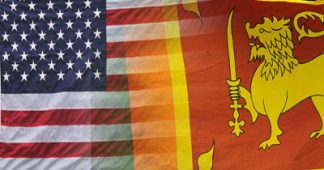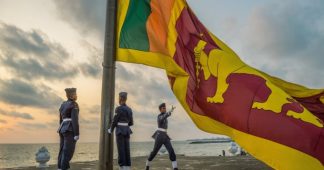By Lasanda Kurukulasuriya
23 October 2019
United National Front (UNF) presidential candidate Sajith Premadasa’s remarks on the foreign policy that could be expected of a government led by him, in the event of an election victory, have been sketchy. There have also been contradictions in positions taken at different times and at different venues. This leaves the voter in a quandary as to the policy that might emerge in this important area, if Premadasa becomes Head of State, Head of the Executive and of the Government, and Commander in Chief of the Armed Forces, as the next President of Sri Lanka. We need to remember that the leadership change takes place at a time when the country needs to skillfully navigate geopolitical tensions caused by big power rivalry in the region.
On Thursday at rallies in Kurunegala district Premadasa spoke with emotion about sacrifices made by security forces during the war, vowing never to betray them even if it meant ‘laying down his life.’ The fiery speeches came after his main rival, SLPP candidate Gotabaya Rajapaksa held his first press conference at the Shangri La hotel on Tuesday (15), where he categorically rejected UNHRC resolution 30/1 co-sponsored by the yahapalana government in 2015. Gotabaya said he ‘couldn’t recognise what they signed with another government’ and that it was not a legal document, asserting however that he would continue to work with the UN rights organization to resolve issues. Resolution 30/1 has met with opposition as it is widely seen as being anti-Sri Lanka, and particularly inimical to the security forces, credited with ending LTTE terror. Although then foreign minister Mangala Samaraweera signed up to co-sponsor the resolution, President Maithripala Sirisena has said he never endorsed the move.
One of Sajith Premadasa’s first statements on foreign policy was at an interaction with diplomats on 2nd Oct. Flanked by Finance Minister Mangala Samaraweera, Foreign Minister Tilak Marapana and Minister of Development Strategies Malik Samarawickrema, the newly-declared presidential candidate spoke on what he described as ‘Sri Lanka’s policy in the future with regard to inter-state relations.’ Premadasa wound up his comments saying “I want to assure you that we remain firmly committed to working as a team in government, and that we will ensure that Sri Lanka meets its voluntary international commitments.” Although it is not explicitly mentioned, the latter assertion would seem to refer to the US-led Geneva resolution which Sri Lanka ‘voluntarily’ co-sponsored. Premadasa’s statement was circulated to media by minister Samaraweera’s office.
Samaraweera’s touch may be detected elsewhere in the document as well. Buzz words and phrases such as ‘open trade,’ ‘freedom of navigation,’ ‘rules based order’ ‘transforming Sri Lanka into a hub in the Indian Ocean’ etc, are associated with the US’s economic/political reform agenda in Sri Lanka, of which the pro-US finance minister is a key proponent. Premadasa’s statement describes them as ‘principles’ that ‘Sri Lanka will remain firmly committed to.’ There is also reference to ‘countering violent extremism’ – a concept increasingly being discussed by international-relations organisations, and which turns out to be Western in origin. It has been critiqued by Russian Foreign Minister Sergey Lavrov as one which “lays the blame for the dissemination of radical ideologies and expansion of the social base of terrorism on political regimes that the West has proclaimed undemocratic, illiberal or authoritarian.” While the UNF candidate’s remarks to the diplomatic corps were of a general nature, nowhere was there any mention of Non-alignment, or UN Charter principles, only a commitment to “maintaining a policy of friendship with all nations, both in the region and beyond.”
The reference to promoting Sri Lanka “as a Rest and Recreation Centre in the Indian Ocean with sports tourism and newer forms of tourism” as part of the foreign policy agenda is also a matter of concern. Particularly so in a context where it is known that the US seeks to use Sri Lanka as a military logistics hub in the Indian Ocean (‘Duplicity and doublespeak at work: US military logistics hub,’ The Island 05.02.19)
‘Rest and Recreation’ or ‘R&R’ in US military terminology, is “a term used for the free time of a soldier or international UN staff serving in unaccompanied (no family) duty stations,” according to Wikipedia. “Prostitution has long been part of what military men have participated in as part of their “R&R,” it adds. The question arises as to whether ‘promoting Sri Lanka as a Rest and Recreation Centre in the Indian Ocean’ is in fact a veiled reference to promoting sex tourism.
The R&R centre envisaged in the foreign policy statement also needs to be seen in the context of the Acquisition and Cross Service Agreement (ACSA) signed by Sri Lanka in August 2017, which according to available information lays the groundwork for various units of the US military, listed in annexures running into nearly 80 pages, to enter the country. In addition, a Status of Forces Agreement (SOFA) currently under negotiation between the governments of Sri Lanka and the US, seeks to give US military personnel arriving in the country immunity from prosecution under Sri Lanka’s judicial system (among a slew of other privileges and concessions). If a rape, murder or other crime is committed in Sri Lanka, diplomatic immunity will be cited to protect the US nationals concerned.
The recent case in the UK where a 19-year-old British man Harry Dunn was killed in a crash involving a car driven by the wife of a US diplomat stationed at Royal Air Force Croughton, a US military base, is a grim warning of the kind of problems that could arise with issues relating to diplomatic immunity. The US and UK are now in the throes of a diplomatic spat after Anne Sacoolas, who was driving on the wrong side of the road when her car crashed into the motorcyclist, left Britain for the US – reportedly ‘under diplomatic immunity.’ Reports say Sacoolas refuses to return to Britain to cooperate with the investigation.
It may not be the case that Sajith Premadasa advocates sex tourism in Sri Lanka or that he wishes to convey the impression that it will be encouraged, or to suggest that he is a proxy for US interests. But the relatively young presidential hopeful would need to distance himself from a variety of party interlocutors if he expects to build the popular, people-friendly image he seeks, or for that matter, to project an independent profile of any sort. The extent to which he remains shackled by demands of the party hierarchy, or the degree to which he is compromised by those to whom he is indebted, remains unclear. None of these circumstances are excuses for blunders on the part of someone pitching for the highest office in the land.
One event at which the UNF candidate spoke his mind, unaccompanied, was an AmCham forum where he expressed support for market based economic policies. Asked for his view on how Sri Lanka should be managing its international relationships, Premadasa said external relationships will be “purely based on achieving national interest” and that he would adopt “a highly realist power-politics based approach that will bring maximum benefit to the country.” This does not fully correspond with the drift of his remarks to the diplomats.
Following Gotabaya’s rejection of Resolution 30/1, Samaraweera issued a media statement defending the resolution. He claimed that following the presidential election of January 8, 2015, the government co-sponsored Resolution 30/1 to “reassert Sri Lanka’s sovereign right to solve its own problems locally.” But it is precisely the fact that Resolution 30/1 did NOT allow Sri Lanka to ‘solve its own problems locally’ and instead called for the participation – in a judicial mechanism – of foreign judges, defence lawyers, prosecutors and investigators, that triggered outrage at home. The resolution was seen to compromise sovereignty.
In a further sleight of hand, the former foreign minister sought to equate the foreign judges in the mechanism anticipated in Resolution 30/1 with the legal Advisory Council and team of foreign experts who advised the Paranagama Commission, appointed by the Rajapaksa government to look into possible HR violations during the war (“a mechanism … in which there would be the participation of foreign jurists just like President Mahinda Rajapaksa had foreign experts in the Paranagama Commission.”) Surely the minister would know there is a difference between the role played by a legal advisor and that of a judge. He also said the co-sponsorship of the resolution was “based on the mandate received from the voters to implement the 100-Day program.” On the contrary, what the 100-Day Programme said (item 93), was that any allegations of war crimes will be adjudicated by a ‘national, independent court’ (desheeya swaadeena adhikaranayak).
Samaraweera was among Premadasa’s earliest backers during UNP nomination saga. Is he attempting to influence positions taken on the diplomatic/ foreign relations front? What the candidate himself thinks on these matters is far from clear. Rather, his speeches have been filled with an abundance of welfare-related promises. This makes it difficult for the discriminating voter to know who or what the swan symbol stands for in the vital area of foreign policy.
This article first appeared in The Island.
Published at https://datelinecolombo.wordpress.com/2019/10/23/premadasa-on-external-relations-president-or-proxy/
